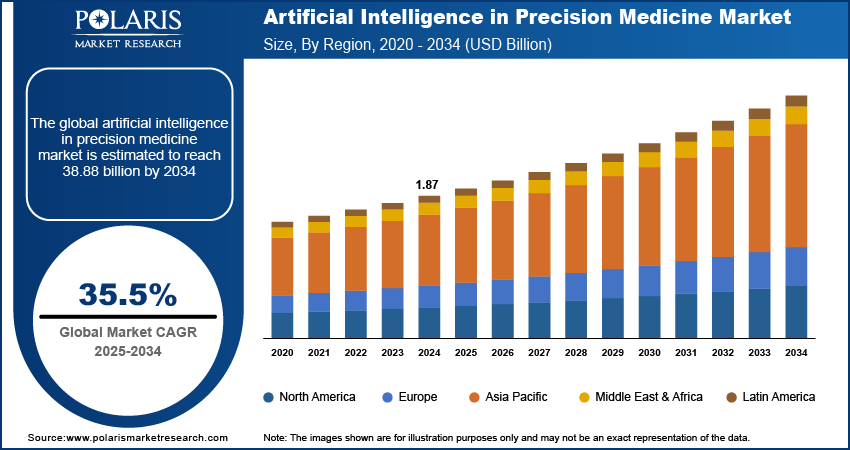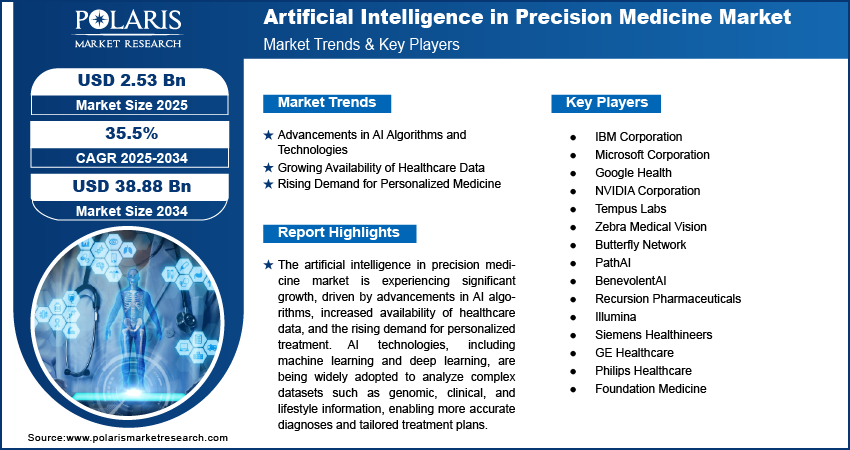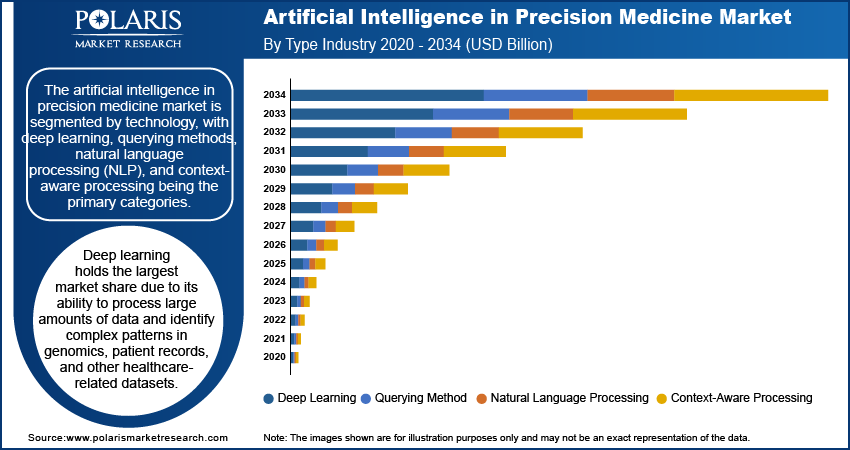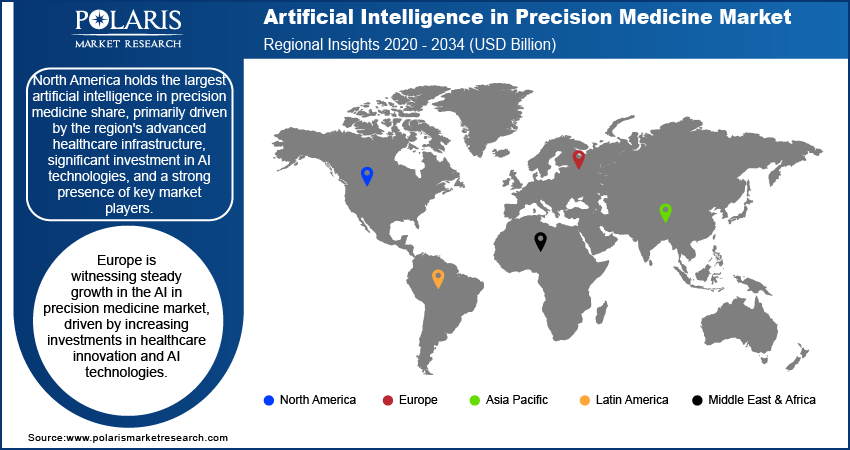
Artificial Intelligence in Precision Medicine Market Size, Share, Trends, Industry Analysis Report
: By Technology (Deep Learning, Querying Method, Natural Language Processing (NLP), and Context-Aware Processing), Component, Therapeutic Application, and Region (North America, Europe, Asia Pacific, Latin America, and Middle East & Africa) – Market Forecast, 2025–2034
- Published Date:Mar-2025
- Pages: 118
- Format: PDF
- Report ID: PM2986
- Base Year: 2024
- Historical Data: 2020-2023
Artificial Intelligence in Precision Medicine Market Overview
The artificial intelligence in precision medicine market size was valued at USD 1.87 billion in 2024. The market is projected to grow from USD 2.53 billion in 2025 to USD 38.88 billion by 2034, exhibiting a CAGR of 35.5% during 2025–2034.
Artificial intelligence (AI) in precision medicine market refers to the integration of AI technologies in the field of healthcare to enhance personalized treatment and improve patient outcomes. AI applications in precision medicine leverage machine learning, deep learning, and data analytics to analyze genetic, clinical, and lifestyle data, enabling more accurate diagnosis, treatment planning, and drug development. The market key drivers include advancements in AI algorithms, increasing healthcare data availability, and the rising demand for personalized medicine. Trends such as the growing adoption of AI-based tools for genomic analysis, the use of AI in drug discovery, and the rise of virtual health assistants are also contributing to artificial intelligence in precision medicine market expansion.

To Understand More About this Research: Request a Free Sample Report
Artificial Intelligence in Precision Medicine Market Dynamics
Advancements in AI Algorithms and Technologies
One of the primary drivers of the artificial intelligence in precision medicine market is the rapid advancement in AI algorithms and technologies. Over the past decade, machine learning and deep learning models have significantly improved in terms of accuracy and speed, enabling AI to process and interpret large datasets in healthcare more effectively. These algorithms are capable of identifying patterns in complex genetic, clinical, and environmental data, making them valuable tools for personalized treatment and disease prediction. For example, AI systems are now able to predict the likelihood of diseases such as cancer or diabetes based on genetic profiles. The increasing sophistication of AI models, including natural language processing (NLP) and neural networks, is driving the growth of AI applications in healthcare. As these technologies continue to evolve, they are expected to lead to even more precise and personalized medical solutions.
Growing Availability of Healthcare Data
The growing availability of healthcare data is another artificial intelligence in precision medicine market driver. The healthcare industry has seen an increase in the amount of patient data being generated, such as genomics, electronic health records (EHRs), and wearables. This vast amount of data provides an opportunity for AI to play a more substantial role in precision medicine by extracting meaningful insights from large datasets. In particular, genomic data has proven to be valuable for understanding diseases at a molecular level, allowing for more precise treatment plans tailored to an individual's unique genetic makeup. According to a study published in Nature Biotechnology, the amount of genomic data generated globally is expected to double every two years, making data-driven AI applications more important in the development of personalized healthcare solutions. The widespread adoption of EHRs and other digital health tools also contributes to more accessible and analyzable data.
Rising Demand for Personalized Medicine
The increasing emphasis on personalized medicine is a significant factor driving the AI in precision medicine market demand. Personalized medicine, which tailors treatment strategies to an individual's genetic makeup, lifestyle, and environment, has gained momentum due to its potential to improve patient outcomes. Patients and healthcare providers are increasingly seeking more effective treatments that are specific to their needs rather than relying on one-size-fits-all approaches. AI plays a crucial role in this shift by processing patient data to offer more accurate predictions and help doctors identify the best possible treatment options. Research indicates that personalized medicine could improve clinical outcomes in areas such as cancer, with studies showing that patients treated with precision medicine approaches often experience better survival rates compared to those receiving traditional treatments. The growing awareness of the benefits of personalized medicine, combined with technological advances in AI, is propelling its adoption in various medical fields.

Artificial Intelligence (AI) in Precision Medicine Market Segment Insights
Artificial Intelligence in Precision Medicine Market Assessment by Technology
The artificial intelligence in precision medicine market segmentation, based on technology, includes deep learning, querying methods, natural language processing (NLP), and context-aware processing. Deep learning holds the largest market share due to its ability to process large amounts of data and identify complex patterns in genomics, patient records, and other healthcare-related datasets. This technology has proven highly effective in areas such as disease diagnosis, predictive modeling, and drug discovery, driving its widespread adoption. Deep learning models, especially convolutional and recurrent neural networks, are extensively used to analyze medical imaging and genomics data, making it a dominant player in the market. Additionally, deep learning’s capacity to improve over time with exposure to more data contributes to its growing relevance in precision medicine.
Natural language processing (NLP) and querying methods are also gaining traction in the AI-driven precision medicine space, particularly for extracting actionable insights from unstructured data such as electronic health records, clinical notes, and research papers. NLP in healthcare and life sciences is crucial for converting unstructured text data into structured information that can be analyzed alongside structured clinical data. Context-aware processing, which adapts to the environment or situation, is witnessing increased usage for personalized treatment recommendations and real-time healthcare support. However, despite the growth in these segments, deep learning remains the leader in terms of market share and growth due to its transformative potential across various medical applications.
Artificial Intelligence in Precision Medicine Market Evaluation by Component
The AI in precision medicine market, by component, is segmented into hardware, software, and services. The software segment holds the largest market share, driven by the increasing adoption of AI-based applications and platforms for data analysis, predictive modeling, and personalized treatment solutions. Software solutions, including machine learning algorithms, data analytics tools, and AI-powered platforms, are integral to the success of AI in precision medicine. The continuous advancements in software capabilities, along with the increasing demand for AI-driven medical applications, are contributing to the segment's dominance. This segment is registering significant growth as healthcare providers seek to integrate AI solutions for improving diagnostic accuracy, optimizing treatment plans, and enhancing drug discovery processes.
The services segment is also experiencing rapid growth, fueled by the increasing need for AI consultancy, integration, and support services. As healthcare organizations adopt AI technologies, the demand for specialized services such as system implementation, training, and ongoing maintenance has surged. The growth of this segment is primarily driven by healthcare providers' need for expertise to effectively deploy and manage AI systems. The hardware segment, while important, is relatively smaller in comparison. However, advancements in processing power, storage capabilities, and specialized AI hardware such as GPUs and cloud infrastructure are supporting the broader adoption of AI applications in precision medicine.
Artificial Intelligence in Precision Medicine Market Assessment by Therapeutic Application
The artificial intelligence in precision medicine market is segmented by therapeutic application, including oncology, cardiology, neurology, respiratory, and others. Oncology holds the largest artificial intelligence in precision medicine market share, driven by the growing need for AI-based solutions to enhance cancer detection, diagnosis, and personalized treatment plans. AI technologies are widely used in oncology for tasks such as analyzing medical imaging, identifying genetic mutations, and predicting treatment responses, which significantly improve clinical outcomes. As a result, AI's application in oncology continues to expand, supported by ongoing research and the increasing focus on cancer immunotherapy and targeted treatments.
The neurology segment is also registering the fastest growth within the market, fueled by advancements in AI technologies that enable early diagnosis and personalized treatment for neurological disorders such as Alzheimer's disease, Parkinson's disease, and multiple sclerosis. AI is being utilized to analyze brain imaging, genetic data, and patient records to predict disease progression and optimize therapy regimens. The growing prevalence of neurological diseases and the push for precision medicine in this field are driving the rapid adoption of AI-based solutions. Additionally, the application of AI in cardiology and respiratory care is also expanding, though not at the same pace as oncology and neurology.

AI in Precision Medicine Market Regional Insights
By region, the study provides artificial intelligence in precision medicine market insights into North America, Europe, Asia Pacific, Latin America, and the Middle East & Africa. North America holds the largest market share, primarily driven by the region's advanced healthcare infrastructure, significant investment in AI technologies, and a strong presence of key market players. The US, in particular, has seen widespread adoption of AI in healthcare, supported by government initiatives, a high demand for personalized medicine, and ongoing research in AI applications for disease diagnosis and treatment optimization. Additionally, North America's large volume of healthcare data and a robust regulatory framework that supports innovation contribute to the region's dominance. Europe and Asia Pacific are also witnessing growth, with Asia Pacific experiencing the fastest expansion due to increased healthcare digitization and rising investments in AI technologies.
Europe is witnessing steady growth in AI in precision medicine market, driven by increasing investments in healthcare innovation and AI technologies. Countries such as the UK, Germany, and France are at the forefront of AI adoption in healthcare, supported by strong government initiatives and collaborations between healthcare providers and AI technology developers. The European Union’s focus on digital health strategies and regulatory frameworks for AI is further fostering market expansion. Additionally, the growing emphasis on personalized medicine, particularly in oncology and neurology, is driving demand for AI-powered solutions across the region. However, varying levels of adoption across different European countries and regulatory challenges pose some constraints on the market's overall growth.
Asia Pacific is experiencing the highest growth in the artificial intelligence in precision medicine market, with countries such as China, Japan, and India leading the way. The region’s rapid healthcare digitalization, increasing investments in AI research, and a large patient population contribute to the accelerated adoption of AI technologies. China, in particular, is making significant strides in AI-driven healthcare solutions, supported by government policies aimed at advancing digital health. India is also emerging as a key market, driven by its growing healthcare sector and demand for personalized treatment. Despite the region’s growth potential, challenges such as infrastructure limitations and regulatory hurdles remain, though these are being gradually addressed by both governments and private sector investments.

Artificial Intelligence in Precision Medicine Market – Key Players and Competitive Insights
Key players in the artificial intelligence in precision medicine market include IBM Corporation, known for its Watson Health division, which uses AI to help healthcare professionals in oncology and drug discovery. Microsoft Corporation is active with its Azure cloud platform, which supports AI-driven solutions for precision medicine, including genomic data analysis. Google Health is another key player leveraging AI in healthcare, particularly in medical imaging and predictive analytics. NVIDIA Corporation has established itself with AI hardware and software platforms aimed at accelerating research in precision medicine. Tempus Labs, a health technology company, is integrating AI and machine learning with clinical and molecular data to help guide treatment decisions, primarily in oncology.
Other notable players include Zebra Medical Vision, a company focused on AI-powered medical imaging to detect diseases such as cancer and cardiovascular conditions. Butterfly Network, known for its handheld ultrasound devices, uses AI to enable rapid diagnostics and improve patient outcomes. PathAI uses machine learning technology to assist pathologists in diagnosing diseases more accurately. BenevolentAI is involved in drug discovery using AI, focusing on developing personalized treatments for diseases such as cancer and neurological disorders. Prognos Health integrates AI to mine medical data for insights that can lead to personalized treatment strategies. Recursion Pharmaceuticals uses AI to advance drug discovery, focusing on rare diseases and targeting precision therapies.
In terms of competitive insights, the AI in precision medicine industry is characterized by a focus on innovation, with companies investing in research and development to create tailored solutions for various medical fields. Key players such as IBM, Microsoft, and Google Health are competing by leveraging their existing technological infrastructures to expand their presence in healthcare. Smaller, specialized companies such as Tempus Labs and Recursion Pharmaceuticals focus on niche areas such as oncology and rare disease treatment, offering advanced AI tools for data-driven insights. Additionally, partnerships between AI technology companies and healthcare providers are becoming more common, with the aim of enhancing the precision and accessibility of personalized medicine. The market is dynamic, with players constantly striving to refine their AI algorithms and expand the scope of their applications to cater to diverse medical needs.
IBM Corporation is a major player in artificial intelligence in precision medicine market. The company focuses on using AI to assist healthcare providers with data analysis, drug discovery, and precision treatments, primarily through its Watson Health division. IBM’s AI solutions are used to analyze clinical data, medical images, and patient records to help healthcare professionals make more informed decisions. The company has been working to integrate AI technologies with genomics to support personalized treatment plans, particularly in oncology.
Microsoft Corporation is another significant player in the market. It utilizes its Azure cloud platform to provide AI-based solutions in healthcare. Microsoft’s AI technology supports the analysis of large datasets, such as medical images and genomic data, helping doctors deliver more accurate diagnoses and personalized treatments. The company has been actively collaborating with healthcare organizations to apply AI in various therapeutic areas, including cancer and cardiovascular diseases.
List of Key Companies in Artificial Intelligence in Precision Medicine Market
- IBM Corporation
- Microsoft Corporation
- Google Health
- NVIDIA Corporation
- Tempus Labs
- Zebra Medical Vision
- Butterfly Network
- PathAI
- BenevolentAI
- Recursion Pharmaceuticals
- Illumina
- Siemens Healthineers
- GE Healthcare
- Philips Healthcare
- Foundation Medicine
Artificial Intelligence in Precision Medicine Market Developments
- October 2023: Microsoft launched a new AI-powered tool to streamline the process of diagnosing cancer. Microsoft collaborated with research institutions to improve accuracy and speed in detecting malignancies.
- September 2023: IBM announced a partnership with the Mayo Clinic to enhance AI-driven precision medicine capabilities, focusing on improving patient outcomes through the use of advanced AI analytics.
Artificial Intelligence in Precision Medicine Market Segmentation
By Technology Outlook
- Deep Learning
- Querying Method
- Natural Language Processing (NLP)
- Context-Aware Processing
By Component Outlook
- Hardware
- Software
- Services
By Therapeutic Application Outlook
- Oncology
- Cardiology
- Neurology
- Respiratory
- Others
By Regional Outlook
- North America
- US
- Canada
- Europe
- Germany
- France
- UK
- Italy
- Spain
- Netherlands
- Russia
- Rest of Europe
- Asia Pacific
- China
- Japan
- India
- Malaysia
- South Korea
- Indonesia
- Australia
- Vietnam
- Rest of Asia Pacific
- Middle East & Africa
- Saudi Arabia
- UAE
- Israel
- South Africa
- Rest of Middle East & Africa
- Latin America
- Mexico
- Brazil
- Argentina
- Rest of Latin America
Artificial Intelligence in Precision Medicine Market Report Scope:
|
Report Attributes |
Details |
|
Market Size Value in 2024 |
USD 1.87 billion |
|
Market Size Value in 2025 |
USD 2.53 billion |
|
Revenue Forecast by 2034 |
USD 38.88 billion |
|
CAGR |
35.5% from 2025 to 2034 |
|
Base Year |
2024 |
|
Historical Data |
2020–2023 |
|
Forecast Period |
2025–2034 |
|
Quantitative Units |
Revenue in USD billion and CAGR from 2025 to 2034 |
|
Report Coverage |
Revenue Forecast, Market Competitive Landscape, Growth Factors, and Industry Trends |
|
Segments Covered |
|
|
Regional Scope |
|
|
Competitive Landscape |
|
|
Report Format |
|
|
Customization |
Report customization as per your requirements with respect to countries, regions, and segmentation. |
How is the report valuable for an organization?
Workflow/Innovation Strategy
The artificial intelligence in precision medicine market has been segmented into detailed segments of technology, component, and therapeutic application. Moreover, the study provides the reader with a detailed understanding of the different segments at both the country and regional levels.
Growth/Marketing Strategy
The growth and marketing strategy for the AI in precision medicine market primarily focuses on partnerships, collaborations, and innovation to enhance AI capabilities in healthcare. Companies are investing in research and development to improve their AI algorithms and extend their applications across various therapeutic areas, including oncology, cardiology, and neurology. Strategic collaborations with healthcare providers, research institutions, and pharmaceutical companies are common to accelerate the adoption of AI-driven solutions. Additionally, expanding AI solutions to emerging markets and leveraging digital platforms to engage healthcare professionals and patients are key tactics in increasing market penetration. Companies are also focusing on regulatory compliance to ensure their solutions meet the evolving healthcare standards
FAQ's
? The artificial intelligence in precision medicine market size was valued at USD 1.87 billion in 2024 and is projected to grow to USD 38.88 billion by 2034.
? The market is projected to register a CAGR of 35.5% during the forecast period, 2025-2034
? North America had the largest share of the market.
? Key players in the artificial intelligence in precision medicine market include IBM Corporation, Microsoft Corporation, Google Health, NVIDIA Corporation, Tempus Labs, Zebra Medical Vision, Butterfly Network, PathAI, BenevolentAI, Recursion Pharmaceuticals, Illumina, Siemens Healthineers, GE Healthcare, Philips Healthcare, and Foundation Medicine.
? The deep learning segment accounted for the larger share of the market in 2024.
? The software segment accounted for the larger share of the market in 2024.
? Artificial intelligence in precision medicine refers to the use of AI technologies, such as machine learning and deep learning, to analyze large and complex healthcare data for personalized treatment and improved patient outcomes. These AI systems are designed to process genetic, clinical, and lifestyle data to provide insights that help in the diagnosis, treatment planning, and drug development specific to an individual's unique characteristics. The goal of AI in precision medicine is to tailor medical care based on the patient's genetic makeup, environment, and personal health history rather than relying on traditional one-size-fits-all approaches. This approach aims to enhance the effectiveness of treatments, reduce side effects, and improve overall healthcare outcomes.
? A few key trends in the market are described below: Integration of Genomic Data: Increasing use of AI to analyze genomic data for more accurate and personalized treatment plans, particularly in oncology. AI in Drug Discovery: Growing application of AI in the development of new drugs, especially for rare and complex diseases. Expansion of AI in Medical Imaging: Widespread adoption of AI-powered tools for medical imaging analysis to detect diseases such as cancer, cardiovascular conditions, and neurological disorders. Personalized Treatment Plans: Rising demand for AI-driven solutions to create tailored treatment regimens based on individual genetic and clinical data.
? A new company entering the artificial intelligence in precision medicine market could focus on leveraging emerging technologies such as AI-driven genomic analysis and personalized treatment solutions to differentiate itself. By developing AI tools that integrate with electronic health records (EHRs) and wearable health devices, the company could offer real-time, data-driven insights for improving patient outcomes. Focusing on niche therapeutic areas such as rare diseases or underexplored conditions may also provide a competitive edge. Additionally, collaborating with healthcare providers and pharmaceutical companies for clinical validation of AI tools would help build credibility and expand market reach. Emphasizing regulatory compliance and data privacy will be critical to gaining trust in the healthcare sector.
? Companies manufacturing, distributing, or purchasing Artificial Intelligence in Precision Medicine and related products, and other consulting firms must buy the report.
